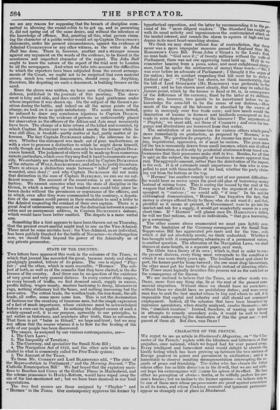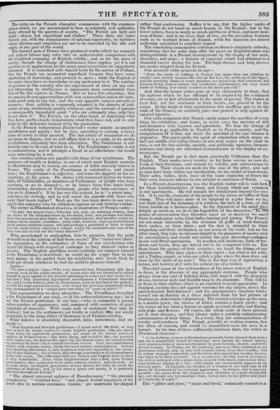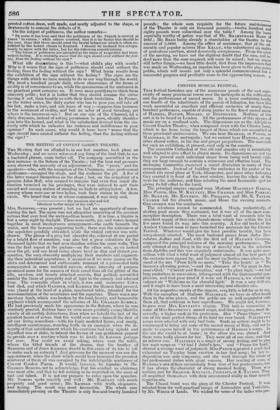CHARACTER OF THE FRENCH.
WE regret to see an article in Black wood's Magazine, on "the Cha- racter of the French," replete with the blindness and bitterness of that prejudice, once national, which we hoped had for ever passed away. Every intelligent and benevolent mind would delight to cherish the kindly feeling which has been growing up betireen the two nations 9f Europe greatest in power and preeminent in civilization ; and it is lamentable to observe insulting misrepresentation interrupting the re- gards of peace and friendship. The writer who has chosen the latter odious office has so little discretion in his ill-will, that we are not with- out hope his extravagance will disarm his spleen of its effect. He has either no perception of obvious truths, or he wilfully prefers his pas- sion's fancies; but we incline to the former opinion—we believe him to be one of those men whose prepossessions are proof against conviction in all its forms, and whose Cockney conceits and ignorant pretensioP appear so strangely out of place in Blackwood.
The critic on the French character commences with the common- places which we are accustomed to hear so solemnly and authorita- tively uttered by the parrots of society. " The French are light and fickle ; clever, but superficial and shallow." These dicta one hears thrown out, with the complacency of national superiority, by babblers whose idleness and emptiness are not to be exceeded by the idle and empty of any part of the world. The learned men of France have produced works which for research and patient labour may enter into no unfavourable comparison with the weightiest examples of English solidity ; and as for the mass of
society, though the el-large of shallowness there applies, yet it is not peculiar in its application, for the many must everywhere be imperfectly informed. It is remarked with shrewd truth by the author of Pelham,
that the French are accounted superficial because they have some smattering of knowledge, mid pretend to more ; while the English of
the same class have no knowledge or any pretension to it. The number of persons in this country who are unpossessed of ideas on any sub- ject interesting to intelligence is immensely more considerable than that of the like ciphers in France. But we have this advantage, that the maxim de non apparentibus et de non existentibus eadenz eel ratio, holds good only in our law, and the very opposite opinion prevails in manners : thus, solidity is commonly assumed in the absence of indi- cation of any intellectual quality whatever, and the amount of persons is consequently formidably great "who are -extremely wise, only they do not show it." The French, on the other hand, in displaying what they have, pretty clearly demonstrate what they have not, and we rate them by the deficiency instead of by the possession. In the French temperature Bladavood's writer admits an amiable cheerfulness and gayety ; but he lays, according to custom, a heavy
share of vanity to their account. The last article of accusation we do not mean to dispute, but we will affirm that it is a vanity, in its modes of exhibition, singularly free from affectation. The Frenchman is suf- . ficiently vain to be vain of what he is. The Englishman's vanity is not so conscientious, and it attempts a fraud in an affectation—he would seem something he is not. Our vanities seldom run parallel with those of our neighbours. The pretences of wealth or fashion, to one of which most English conceits or affectations may be traced, are sources of foible scarcely known in France. The vanity of the Frenchman is substantive, and stands alone; the Englishman's is adjective, and leans for support on his as- sociations or his purse. He shines with borrowed lights-he knows
or members of Parliainent, &lie-op-re who keep carriages, or go to Almack's ; or he knows those who know lords, honourables, members of Parliament, people who keep carriages, or who go to Almack's. If he has not this conceit, he is "a warm man," and cares for nobody, and he will count his pounds with those who carry their heads higher! Such are the. two large Motes in our eyes ; and in this categmy.why. be critical or curious on our brother's beam : The writer in Blackwoodobserves, in illustration of Frencli,vanity- " To take the lowest class—Who-has not, even on entering France, seen
one driver of the diligence draw up his naked, dirty, and perhaps wet limbs, from the monstrous jack-boots of the establishment, that another might in- troduce his in similar condition; while both, however, wore an embroidered jacket and an artificial queue, and had perhaps a pocketful of flour to strew over his head before entering a village, where the incessant cric-crac of his whip was sure to call out the rustic damsels ?"
Who, accustomed to analyzation, fails to perceive, that the pride of wealth is at the bottom of half these sneers? The "naked wet limbs" are reproaches, in the estimation of those of our countrymen who regard all things with respect or contempt as they indicate riches or poverty. The English postillion would certainly not comport himself
as the Frenchman is described ; he would lay his wager that he had more money in his pocket than his neighbour, and, thank God, he could get drunk whenever he had the mind to pleasure himself. Again— "To take a higher class—Who ever observed two Frenchmen talk for a moment, even in the public streets, of whom each did not theatrically adjust himself so as to appear to the utmost advantage to every eye that could over- look him ? This theatrical adjustment accompanies a Frenchman through life; and I verily believe, that no Frenchman, even at the foot of the gallows, or with. the rope around his neck, ever forgot the previous adjustment of his toes, accompanied by a soupir pour son amie,' or pour sa patrie: "
This representation we deny altogether. The Frenchman described is the Frenchman of our stage, or of the anterevolutionary age ; he is not the French gentleman of our time,—who is commonly a person rather careless of appearance, and, compared with ourselves, of great simplicity of manners. With some cant of sentiment they may be touched ; but as the sentiments are kindly or exalted, tltey are surely preferable to the slang either of Mammon or of Fashion worship. What follows is absolutely disgustful, false, indecO'rous, and un- manly :-
"hiost English and Scottish gentlemen—(I speak not of tht Irish, as they have a taste for female ugliness)—most English gentlemen, who are above being taken by superficial pretension, are aware of the almost universal ugliness of Frenchwomen;—the hard, sharp, and wrinkled fare, the greenish dark complexion, the hair on the upper lip, the hoarse voice, the almost bestial expansion of the lower ribs to contain enormous viscera. Now, the combination of this with extreme vanity, elicits the most curious consequences. Instead of moderating affectation, it only inspires a desperate ingenuity in the inven-
tion of new fashions ; for of these, this strange combination of circumstances is the real origin. The difference between French and English taste in dress is very remarkable. Even when Englishwomen take a hint from French contrivances, they endeavour to be more natural, modest, and classical. As to male dress, an English gentleman always desires his tailor to avoid the extremes of fashion ; and, as his dress is grave and manly, it is generally followed throughout Europe."
"The almost universal ugliness of Frenchwomen," "the greenish complexion," "wrinkled face," "and almost bestial expansion of the lower ribs to contain enormous viscera," are assertions for disgust
rather than controversy. Suffice it to say, that the higher ranks of the French do not boast so much beauty as the English ; but in the lower orders, there is nearly as much prettiness of face, and more neat- ness of form; and in no class, high or low, are the prevailing features such as to warrant terms of disgust, while the manners are almost uniformly calculated to conciliate regard.
The concluding comparative criticism on dress is singularly unlucky, considering that for some time after the peace an Englishwoman was distinguishable in a French drawingroom by the display of her neck, shoulders, and arms ; a fashion of exposure which had obtained to a shameful excess during the war. The high dresses and long sleeves are modes adopted from the French.
Our accurate critic proceeds to say-
" Even the mode of walking in France has more than one relation to vanity—not merely because the rise on the toes, the writhing of the figure, and the paralytic shake of every member, are inspired by that sentiment, but because being, from a curious and accidental circumstance, the very worst mode of walking, it is vainly vaunted as the most graceful."
And then the honest writer goes on very elaborately to show, that the motions which he has affirmed to be inspired by the sentiment of vanity, are in fact attributable to the mode of paving. The stones at their feet, not the sentiment at their hearts, are proved to be the cause. In the laugh at their maintaining this shuffling gait to be the walk of the Graces, we cordially join—our protest is only against ill- natured injustice.
Our critic complains that French vanity causes the sacrifice of every thing for exhibition ; and hence, in every case, the mixture of dirt and meanness with expense and splendour. We fear the charge of exhibition is is applicable to English as to French society, and the completeness of it does not abate the mischief of the vice whence it originates. The purse-pride, the spirit of ostentation which urges on half our middle and higher classes in one mad career on the road to ruin, is not the less morally, socially, and politically injurious, because neatness and nicety are attendant circumstances in the display of ex- travagance.
But the French are in fact more practically Utilitarian than the English. Their modes never wander so fur from service as ours do. Look at their furniture, and remark its solidity, and subserviency to intention. Their chairs are made for the ease of the sitter, and not as ours have been within our recollection, on the model of toad-stools. Their sofas, tables, beds, have all the same character of fitness for their uses, however inferior to our articles in exactness of -finish.
In a French drawingroom, too, the English visitor will in vain look for those knickknackeries of fancy and luxury which are common in our apartments. He-vvill remark few indulgences beyond the use it is not the character of the people to lay stress on trifles of that stamp. They will make more of an epigram or a joke than we but think less of the fastening of a window, the lock of a door, or the brass buckle on a harness-plate. In the ,bijouterie of tlie mind they delight as much as we do in the bagatelles of the decorator.r1iiire4 graces of conversation they therefore excel vs as much as we excel them in mahogany nobs, brass bolts, turning and joining. The French are not made Miserable bye the invasion of puff's of wind through their sashes, or their doors ; and the fact is shameful to their carpentery and their civilization, in our sense of the word : but on the other hand, they take an intenser delight in the pleasures of society (not its ostentations), and would not endure the poor bavardage common in our well-fitted apartments. in woollen and hardware, both of fur- niture and heads, they are indeed not to be compared with us. Let them -boast the sayings of their societies ; we boast the doings of our upholsterers. They may rejoice in their esprit but what is wit with- out a Turkey carpet, or who can relish a joke when the door does not close by the ninth of an inch ? This is the true way of appraising a nation, and looking at it with the critical eye of a broker.
The chief cause of the awkwardness of the lower orders of English in dress, is the absence of any appropriate costume. People who always wear one sort of holyday dress, will wear it with the propriety of ease, however rude and humble may be its character. They will be at home in their clothes, which is an essential to good appearance. In England, custom does not appoint costume for any classes, above the smock-frocked field-labourer; and the greengrocer's daughter tricks herself out on Sunday in a dress imitated from the last picture of Fashions in Ackerinann's Repository. The servant-girl trips up the area in a muslin gown, the sleeves of which contain a dozen yards ; and she wears on her head a bonnet as ample as a coal-skuttle, and flaring with fieku and flowers. Of course, the whole souls of these persons are in their dresses ; and they labour under a painfully embarrassing consciousness of their finery. In a word, they are consummations of tawdry awkwardness. The French grisette, or waiting-woman, has her dress of custom, and would he scandalized were she seen in a bonnet. In the face of these sufficiently notorious facts, the writer in Blackwood observes- " As to clothing, women in England are generally better dressed than men ; and one is perpetually struck by observing, even among the lowest classes, very common-looking men accompanied by good-looking, cleanly, and well- dressed women. In France, on the contrary, one is as often surprised to see gentlemen walking arm in arm with women whom, from their sombre, but in colour strongly contrasted, and therefore dirt-concealing woollen dresses, one takes to be their servants. As a reward also for this sort of privation, the wife is indulged with a gauze dress covered with tinsel, such as our itine- rant actresses display at a fair ; with which she occasionally appears at an evening party. In England, the identity of a woman of any rank may at all hours be discovered by her external appearance. In France, this is scarcely possible : she passes from the dinginess and dirtiness of a grub during the day, not through any intermediate state, but at once to the glitter and glare of a butterfly at night."
This "glitter and glare," "gauze and tinsel," commonly consists in a
printed cotton dress, well made, and neatly adjusted to the shape, or dexterously to conceal the defects of it. On the subject of politeness, the author remarks- " By some it has been said that the politeness of the French is carried at times 'to excess ; ' while others contend, that it is far better this should be the case, than that there should exist the brutal behaviour which is often ex- hibited by the lowest classes in England. I should be inclined less scrupu- lously to agree with the latter, but for the following considerations.
"The forms of politeness are intended as the signs of respectful and bene- volent feeling. It is evidently worse that the sign should exist without the feel- ing, than the feeling without the sign."
What idle dogmatizing is this !—what child's play with words! Why is it worse that the sign of politeness should exist without the feeling, than the feeling without the sign ? What harm results from the exhibition of the sign without the feeling ? The signs are the things with which we have mainly to do in our way through the world. We meet a hundred people daily, whose observance of the forms of civility is of convenience to us, while the genuineness of the sentiment in no practical point concerns us. It were more gratifying to think them sincerely polite ; but it is better that they should assume the virtue having it not, than trouble us with their frank brutalities. In France, as the writer states, the dirty carter who has to pass you will take off his hat, make a bows and ask leave of way ;—suppose him insincere in the sentiment of civility, and but an actor of good breeding, yet where is the inconvenience ? But on our side of the Channel, let a dirty drayman, instead of asking permission to pass, silently shmilder you into the kennel, and what is the satisfaction derived from the sin- cerity with which he indicates his rudeness and indifference to your opinion ? In such cases, why would it have been "worse that the sign should have existed without the feeling, than the feeling without the sign ? "




















 Previous page
Previous page